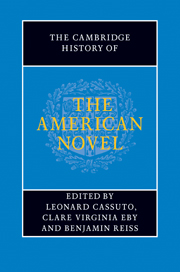Book contents
- Frontmatter
- General Introduction
- PART ONE INVENTING THE AMERICAN NOVEL
- Introduction: inventing the American novel
- 1 Transatlantic currents and the invention of the American novel
- 2 Susanna Rowson, Hannah Webster Foster, and the seduction novel in the early US
- 3 Charles Brockden Brown and the novels of the early republic
- 4 The novel in the antebellum book market
- 5 American land, American landscape, American novels
- 6 Cooper and the idea of the Indian
- 7 The nineteenth-century historical novel
- 8 Hawthorne and the aesthetics of American romance
- 9 Melville and the novel of the sea
- 10 Religion and the nineteenth-century American novel
- 11 Manhood and the early American novel
- 12 Sentimentalism
- 13 Supernatural novels
- 14 Imagining the South
- 15 Stowe, race, and the antebellum American novel
- 16 The early African American novel
- PART TWO REALISM, PROTEST, ACCOMMODATION
- PART THREE MODERNISM AND BEYOND
- PART FOUR CONTEMPORARY FORMATIONS
- A selected bibliography
- Index
13 - Supernatural novels
from PART ONE - INVENTING THE AMERICAN NOVEL
Published online by Cambridge University Press: 28 July 2011
- Frontmatter
- General Introduction
- PART ONE INVENTING THE AMERICAN NOVEL
- Introduction: inventing the American novel
- 1 Transatlantic currents and the invention of the American novel
- 2 Susanna Rowson, Hannah Webster Foster, and the seduction novel in the early US
- 3 Charles Brockden Brown and the novels of the early republic
- 4 The novel in the antebellum book market
- 5 American land, American landscape, American novels
- 6 Cooper and the idea of the Indian
- 7 The nineteenth-century historical novel
- 8 Hawthorne and the aesthetics of American romance
- 9 Melville and the novel of the sea
- 10 Religion and the nineteenth-century American novel
- 11 Manhood and the early American novel
- 12 Sentimentalism
- 13 Supernatural novels
- 14 Imagining the South
- 15 Stowe, race, and the antebellum American novel
- 16 The early African American novel
- PART TWO REALISM, PROTEST, ACCOMMODATION
- PART THREE MODERNISM AND BEYOND
- PART FOUR CONTEMPORARY FORMATIONS
- A selected bibliography
- Index
Summary
The history of the “supernatural novel” is occluded – even occulted – by problems of definition. The first problem is with the term “novel.” The writer at the center of any discussion of the supernatural, Edgar Allan Poe, notoriously favored the short work, because “[T]here is a distinct limit, as regards length, to all works of literary art – the limit of a single sitting.” Many of the most famous nineteenth-century supernatural works are short stories, or at longest novellas; in the twentieth century, supernatural novels are plentiful, but they often become most visible when they are adapted into horror films. A greater problem is “supernatural,” which colloquially signals ghosts, haunting, devils, and the spirit-world. If these are its defining features, how is the American supernatural to be distinguished from “American gothic,” which is a more established critical category? Both the gothic and the supernatural are anti-realist zones of haunting and strangeness, but the supernatural also crosses over into a world of spirits, as the gothic need not; conversely, the gothic always invokes fear, while the supernatural may offer friendly ghosts. Most supernatural texts are gothic, but not all, and vice versa, or as one critic puts it, “The supernatural is permitted but not essential to the Gothic.” The supernatural is not only dificult to separate spatially from other genres; it is also often only a temporary zone within individual works, entered and then abandoned as other explanations for mysteries arise. In Charles Brockden Brown's Wieland (1798), for example, the narrator considers “notions of supernatural agency” as the source for the mysterious voices she hears, only to have their human source revealed.
- Type
- Chapter
- Information
- The Cambridge History of the American Novel , pp. 221 - 235Publisher: Cambridge University PressPrint publication year: 2011



